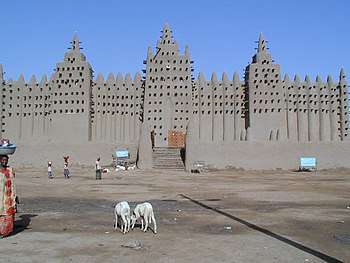Religion in Mali
An estimated 90 percent of Malians are Muslim, mostly Sunni belonging to Maliki school of jurisprudence influenced with Sufism. Ahmadiyya and Shia minorities are also present.[2] Approximately 5 percent are Christian (about two-thirds Roman Catholic and one-third Protestant denominations); the remaining 5 percent of Malians adhere to indigenous or traditional animist beliefs.[3] Atheism and agnosticism are believed to be rare among Malians, most of whom practice their religion on a daily basis, although some are Deist.[4]
Islam
According to the 2005 U.S. Department of State’s annual report on religious freedom, Islam as traditionally practiced in Mali was characterized as moderate, tolerant, and adapted to local conditions.[4] Women were allowed to participate in social economical and political activities and generally do not wear veils.[4] According to the 2012 Pew Forum study The World’s Muslims: Unity and Diversity, 94% of Muslim in Mali surveyed believe that religion very important in their lives, and 71% believe there is "only one true way to understand Islam’s teachings" (24% believing that multiple interpretations of Islam are possible).[2]
Christianity
Secularism
The constitution establishes a secular state and provides for freedom of religion, and the government largely respects this right.[4] Relations between Muslims and practitioners of minority religious faiths are generally friendly, and foreign missionary groups (both Muslim and non-Muslim) are tolerated.[4] Parties based on ethnic or religious lines are banned and public schools do not offer religious instruction.[5]
Freedom of religion
Prior to the Northern Mali conflict, human rights groups recorded "no recent reports of persecution, discrimination, or imprisonment on the basis of religious convictions or affiliation."[5] However, terrorist groups attempted to institute strict Islamic law in the northern parts of the country in 2012 and Mali was listed high (#7) in the Christian persecution index published by Open Doors, which described the persecution in the north as severe.[6][7] In spite of this, a 2015 study estimated some 8,000 believers in Christ from a Muslim background in the country.[8] Several Islamic sites in Mali were destroyed or damaged by vigilante activists linked to Al Qaeda, claiming that "idol worship" characterized the sites.[9] Given the cultural and religious importance of the sites in the city of Timbuctu (Tomboctou), eight of the shrines on the UNESCO heritage list had been fully reconstructed, and another six were in the process of reconstruction, by July 2015.[10] However, the occupation and Sharia law were both short-lived, cut short by a French and Chadian military intervention that began in January 2013.
See also
References
- ↑ "Africa :: MALI". CIA The World Factbook.
- 1 2 "The World's Muslims: Unity and Diversity" (PDF). Pew Forum on Religious & Public life. August 9, 2012. Retrieved June 2, 2014.
- ↑ International Religious Freedom Report 2008: Mali
- 1 2 3 4 5 Mali country profile. Library of Congress Federal Research Division (January 2005). This article incorporates text from this source, which is in the public domain.
- 1 2 Norris, Pippa (3 May 2011). "Muslim support for secular democracy" (PDF). The University of Sydney. p. 5.
- ↑ Report points to 100 million persecuted Christians. Retrieved on 10 January 2013.
- ↑ OPEN DOORS World Watch list 2012. Worldwatchlist.us. Retrieved on 2013-01-18.
- ↑ Johnstone, Patrick; Miller, Duane Alexander (2015). "Believers in Christ from a Muslim Background: A Global Census". IJRR. 11: 14. Retrieved 20 November 2015.
- ↑ Hughes, Dana (2012-07-03). "Al Qaeda destroys Timbuktu shrines, ancient city's spirit". ABC News. Retrieved 2012-07-06.
- ↑ "Tomboctou: Mme IRENA BOKOVA INAUGURE LES MAUSOLEES REHABILITES". Essor. Retrieved 23 July 2015.
